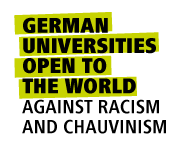
Newsarchiv: Creating knowledge since 1502
Jahr 2020
Quantum physics: Physicists at the University of Halle develop a new theory for Bose-Einstein condensates
Bose-Einstein condensates are often described as the fifth state of matter: At extremely low temperatures, gas atoms behave like a single particle. The exact properties of these systems are notoriously difficult to study. In the journal "Physical Review Letters", physicists from Martin Luther University Halle-Wittenberg (MLU) and Ludwig Maximilian University Munich have proposed a new theory to describe these quantum systems more effectively and comprehensively.
Implantate: Wie lassen sich Komplikationen nach der OP verringern?
Neue Beschichtungen auf Implantaten könnten dabei helfen, diese verträglicher zu machen. Forscherinnen und Forscher der Universität Halle haben ein Verfahren entwickelt, um entzündungshemmende Stoffe auf die Implantate zu bringen und so unerwünschte Entzündungsreaktionen im Körper zu hemmen. Ihre Studie erschien kürzlich im "International Journal of Molecular Sciences".
„Science“-Studie: Chemiker erzielen Durchbruch bei der Synthese von Graphen-Nanobändern
Nanobänder aus Graphen lassen sich in Zukunft deutlich einfacher herstellen als bisher. Einem internationalen Forschungsteam unter Leitung der Universität Halle, der University of Tennessee und des Oak Ridge National Laboratory in den USA ist es erstmals gelungen, das vielseitige Material direkt auf Halbleiter-Stoffen herzustellen. Bisher war das nur auf Metall-Oberflächen möglich. Mit dem neuen Ansatz lassen sich auch die Eigenschaften der Nanobänder wie gewünscht anpassen. Einsatz finden könnte das Material zum Beispiel in der Speichertechnik. Über die Ergebnisse berichtet das Team in der aktuellen Ausgabe von "Science".
Chemists at the University of Halle are able to induce uniform chirality
Chirality is a fundamental property of many organic molecules and means that chemical compounds can appear in not only one form, but in two mirror-image forms as well. Chemists at Martin Luther University Halle-Wittenberg have now found a way to spontaneously induce chirality in crystalline, liquid-crystalline and liquid substances, without requiring any external influence. The findings could be significant for the development of new active substances and for materials science. The study was recently published in "Chemical Science" an international journal published by the Royal Society of Chemistry.
Chronobiologie: Forscher beschreiben Gene, die Pflanzen sagen, wann sie blühen sollen
Woher wissen Pflanzen, wann es Zeit für die Blüte ist? Dieser Frage sind Forscher der Universität Halle nachgegangen und haben zwei Gene ausgemacht, die dafür maßgeblich sind. Sie konnten zeigen, dass die Gene ELF3 und GI die innere Uhr der Pflanzen kontrollieren, die Dauer des Tageslichts überwachen und so zum Beispiel den richtigen Blütezeitpunkt bestimmen. Die Erkenntnisse könnten dabei helfen, Pflanzen zu züchten, die besser an ihre Umgebung angepasst sind. Die Studie wurde in der Fachzeitschrift "The Plant Journal" veröffentlicht.
ALMA LEUCOREA: Neues Buch zur Wittenberger Universitätsgeschichte erschienen
Die Universität in Wittenberg, die Leucorea, war geistiger Ausgangspunkt der lutherischen Reformation und eine der führenden Universitäten in Europa. Rechtshistoriker Heiner Lück, emeritierter Professor der Universität Halle, wirft nun in einer neuen Publikation einen umfassenden Blick auf die Wittenberger Universitätsgeschichte. Das 368 Seiten starke Werk liefert zum ersten Mal seit mehr als 100 Jahren einen Überblick über den gesamten Zeitraum der Existenz der Leucorea von ihrer Gründung 1502 bis zur Vereinigung mit der halleschen Friedrichs-Universität 1817 und über alle an ihr gelehrten Disziplinen. Erschienen ist es im Universitätsverlag Halle-Wittenberg.
Study: Ultra-thin fibres designed to protect nerves after brain surgery
The drug nimodipine could prevent nerve cells from dying after brain surgery. Pharmacists at Martin Luther University Halle-Wittenberg (MLU), in cooperation with neurosurgeons at University Hospital Halle (Saale) (UKH), have developed a new method that enables the drug to be administered directly in the brain with fewer side effects. Their findings were published in the "European Journal of Pharmaceutics and Biopharmaceutics".
Quantenphysik: Physiker der Uni Halle entwickeln neue Theorie von Bose-Einstein-Kondensaten
Bose-Einstein-Kondensate werden häufig als fünfter Aggregatzustand beschrieben: Bei extrem niedrigen Temperaturen verhalten sich die Atome eines Gases wie ein einziges Teilchen. Die genauen Eigenschaften dieser Systeme sind notorisch schwer zu erforschen. In der Fachzeitschrift "Physical Review Letters" schlagen Physiker der Universität Halle und der Ludwig-Maximilians-Universität München eine neue Theorie vor, um die Quantensysteme effizienter und vollständiger zu beschreiben.
Study on body posture: can powerful poses improve self-confidence in children?
A dominant body posture may help children to feel more confident in school. These are the findings of a new study by psychologists from Martin Luther University Halle-Wittenberg and the Otto Friedrich University of Bamberg. The study was recently published in the journal "School Psychology International" and provides initial evidence that simple poses can help students feel better at school.
Electrolysis: Chemists at the University of Halle have discovered how to produce better electrodes
Another step forward for renewable energies: The production of green hydrogen could be even more efficient in the future. By applying an unusual process step, chemists at Martin Luther University Halle-Wittenberg (MLU) have found a way to treat inexpensive electrode materials and considerably improve their properties during electrolysis. The group published their research results in the journal "ACS Catalysis".
Biologen aus Halle und Görlitz modernisieren wichtige Pflanzen-Datenbank
Das Online-Datenportal FloraWeb stellt zahlreiche Informationen zu wildwachsenden Pflanzenarten in Deutschland bereit. Doch die Website ist etwas in die Jahre gekommen. Das Senckenberg Museum für Naturkunde Görlitz und Botaniker der MLU legen das Informationsportal nun neu auf. Es wird modernisiert und aktualisiert sowie durch weitere Datenbanken und einen digitalen Bestimmungsschlüssel, der das genaue Erkennen der Pflanzen erleichtern soll, ergänzt. Das Bundesministerium für Umwelt, Naturschutz und nukleare Sicherheit fördert das Projekt für drei Jahre mit rund 410.000 Euro.
Chemiker der Uni Halle können einheitliche Chiralität gezielt herbeiführen
Die Chiralität ist eine fundamentale Eigenschaft von vielen organischen Molekülen. Sie besagt, dass chemische Verbindungen nicht nur in einer, sondern zwei spiegelbildlichen Formen vorliegen können. Chemiker der Universität Halle haben nun einen Weg gefunden, die Chiralität in kristallinen, flüssig-kristallinen und flüssigen Stoffen spontan, ohne einen äußeren lenkenden Einfluss, herbeizuführen. Die Erkenntnisse könnten für die Entwicklung neuer Wirkstoffe und für die Materialwissenschaften von Bedeutung sein.






